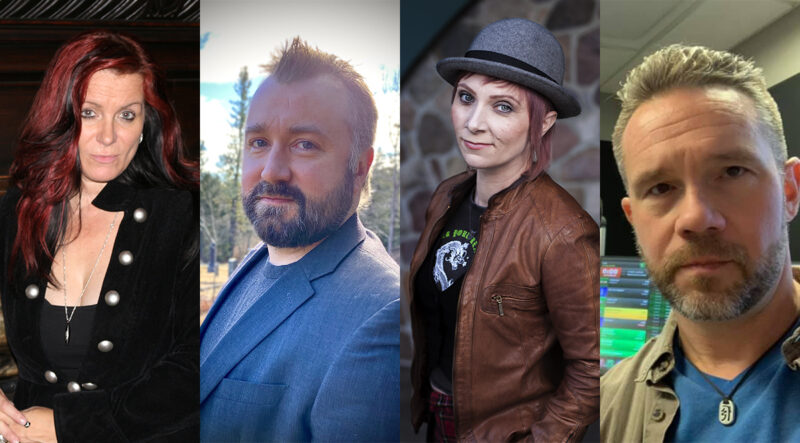Like an underground river, there is a large current of paranormal interest that runs just beneath the surface of Canada.
Ghost stories are shared around campfires as a rite of passage. People travel to historic locations to uncover the past, and maybe to cross paths with a spirit or two. But when it comes to admitting freely any interest in the paranormal or discussing it openly, anonymity or corporate distancing freezes the river solid.
The paranormal is treated by some as a liability on par with algal blooms. It’s an attitude that has frustrated the Canadian paranormal community, many of which wish the chilly reception to the uncanny would finally thaw.
Oil and water
Canada’s lack of openness to the paranormal has prompted Morgan Knudsen to seek out potential opportunities abroad. New York City has been one option.
“The way Canada deals with the paranormal versus America is quite stark,” the 39-year-old said, during a late February phone conversation. “Canada tends to look at this as something more of a liability. It’s almost looked upon with a bit of suspicion.”
Morgan Knudsen has been investigating the paranormal in Alberta for over 20 years and has appeared on the television shows “Paranormal 911”, “Haunted Hospitals” and “A Haunting”.
The interest in the uncanny runs in her blood, as her great-great-grandfather, Dr. Albert Durrant Watson, was the president and founder of the Association for Psychical Research of Canada in 1918. Twenty years ago, she started Entity Seeker with her friend Stephanie Wertz. Wertz, unfortunately, died in 2011, but Knudsen has continued their work, always remembering her friend on her birthday.
It’s not without its challenges, as Knudsen has been caught in a jam with people or companies showing disinterest in the paranormal, or worse, placing gag orders on their employees.
Two locations where she’s experienced a chilly reception from the living have been a former Edmonton bed and breakfast, La Boheme on 112th Avenue NW, as well as the Fairmont Hotel MacDonald on 100th Street.
“I’ve run into that several times. Employees are not allowed to talk about whatever’s going on, even though everybody’s got a story,” Knudsen said, adding the only way they could investigate La Boheme was if they debunked the haunting.
Most of the activity for that location was centralized in the kitchen, however, Knudsen and her team were forbidden from entering it, as well as given strict orders not to talk to the staff.
“There’s a huge audience here for this. People want to learn. People want to be involved,” she said. “But when it comes down to the nitty-gritty of what exactly is going on, there’s nothing.”
Switch gears to cryptozoology, and the same disinterest continues to be present. The lack of a Sasquatch festival in British Columbia or Alberta, which have the most active sightings, flabbergasts Knudsen.
“B.C. is probably one of the biggest hotspots for Sasquatch in the world and there’s not one festival,” Knudsen said. “You go south to California, or the Midwest (U.S.), and you’ve got conferences up the wazoo. It’s so weird.”
For her, the treatment of the paranormal is akin to how Canada treats the arts in general. Former Prime Minister Stephen Harper even said in 2008 that “ordinary Canadians don’t care about the arts”. That was after cutting $45 million of federal funding for the arts.
“They don’t see it as an investment,” she said. “Part of the issue with Canada is the lack of support for artists.
“And then when (artists) leave the country and go to the States, all of a sudden Canada looks at them and says, ‘Look, we made that’.”
That treatment of artists has bled over into the paranormal community. Knudsen may have pointed to the lack of Sasquatch festivals, but it’s also a lack of any events as the stigma associated with the paranormal turns off investors.
The return on investment is there, however, Knudsen asserted, as the U.S. has some of the biggest paranormal conferences in the world, including Contact in the Desert, Phenomecon, Pikes Peak Paranormal Conference, and the International Cryptozoology Conference.
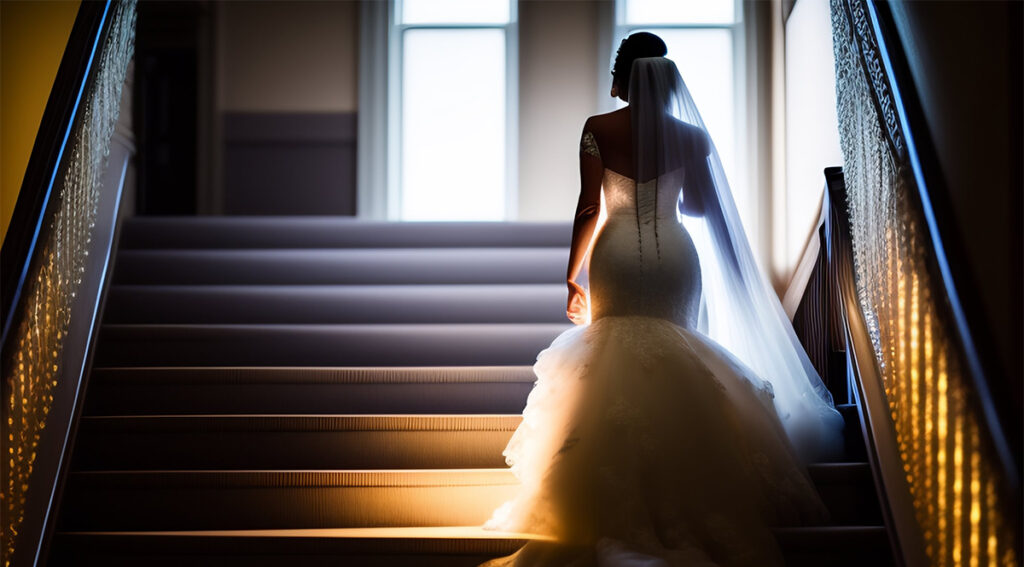
The dancing bride of the Banff Springs Hotel is one of Canada’s most alluring tales of ghostly phenomena. She even has her own stamp.
East Coast Lifestyle
One investigator who is trying to change the trend in Canada is Elliott Van Dusen, the founder of Paranormal Phenomena Research and Investigation (PPRI).
Now based in Sydney, Nova Scotia, the former RCMP officer is using his investigative skills to solve some of the Maritimes’ most elusive paranormal events and reach out to the public through paranormal events.
The Halifax Paranormal Symposium, happening October 7, 2023, at the Halifax Tower Hotel and Conference Centre, is one of the few Canadian events catching the attention of key fixtures within the paranormal community. Cryptozoologist Loren Coleman, demonologist Dr. Richard Gallagher, paranormal investigator Kim Moser, ufologist Chris Styles and parapsychologist Dr. Darryll Walsh have all been invited as guest speakers.
The response to the symposium has been positive, but it has faced challenges with finding locations to host the event.
He co-hosted a 2021 event with his PPRI co-founder Darryll Walsh at the Weston Hotel in Halifax. Van Dusen was aware there were rumours of a ghost at the location, but they were grapevine fodder. Then he played hockey with two former employees of the hotel and also learned his dog groomer also worked at the location and they all had stories.
“Staff had told us a ghost story of a little boy that likes to play in the Atlantic Room on the conference floor,” the 39-year-old recalled. “I had told Darryl about it during the lecture and he had disappeared during our event to go down and check it out.”
Walsh told Van Dusen that he witnessed what he thought to be a little girl jump under one of the tables in another room. When Walsh went to investigate further, no one was there.
The staff revealed that it wasn’t a girl, but a boy with shoulder-length hair. There is the sound of a basketball dribbling that has been heard as well.
After they held their event, Van Dusen asked them if they would host the symposium, but the hotel declined.
“They wrote back, and it was very direct,” he recalled. “They had no interest in having us host the event there, which I was quite surprised about because they were good to deal with for our first event.”
A second experience at the well-known Cellar Bar and Grill in Bedford, Nova Scotia. A fixture in Canadian ghost lore, appearing in “Creepy Canada”, van Dusen emailed them hoping to host a small event at their facility.
All he heard were crickets.
“They just completely ghosted me on that — no pun intended,” he said, with a laugh. “It’s funny because other restaurants that I’ve dealt with, such as the Tavern on Main in Chepachet, Rhode Island, they market that.”
Much to his dismay, Van Dusen said he finds that the larger the business, the more closed off to marketing the paranormal quirks of their brick-and-mortar establishment.
“I would assume it has to do with the stigma that’s attached to the paranormal,” he admitted. “Some people look at you when you talk about the paranormal with that typical, ‘Is this guy crazy? Yeah’ kind of attitude. They don’t want that because they cater to higher-end clients.”
In the twilight of the pandemic, it seems as though people are more receptive to the spiritual aspects of the paranormal and are looking for answers, several paranormal investigators have acknowledged.
“Either you’re a diehard believer or you’re a hardcore skeptic,” Van Dusen said. “There are people that are in between, but it does seem that way.”
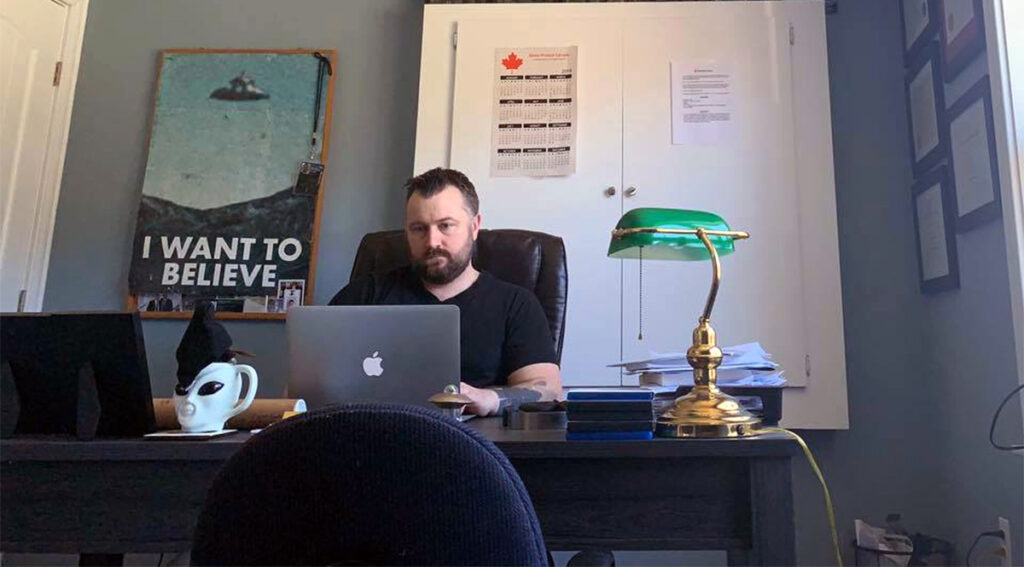
Elliott Van Dusen spent 15 years as an RCMP officer working out of Penticton, Yellowknife and Chester, Nova Scotia.
Out on the West Coast
The pandemic has increased interest in the paranormal for some. Curiosity in the afterlife was piqued by many people succumbing to the virus, or dying from complications brought on by COVID-19.
But the pandemic also brought a wave of conspiracy theorists and misinformation, which may have been unfairly tethered to the realm of the paranormal.
Former journalist turned paranormal investigator for the Canadian Paranormal Society, Jason Hewlett, has experienced the animus firsthand from those who are “hardcore skeptics”.
In an attempt to ask for interviews about cryptozoology with members of the academic community, the 50-year-old Kamloops, B.C. native reached out to professors and received one meandering and belligerent email response.
“(The professor’s) response was, ‘I take it you’re a quote, unquote believer. And I feel strongly that believers don’t operate by the same cognitive rules that I do … I do talk to people who are educated in science and you seem to not know anything about it based on your interests,’” Hewlett shared, adding the academic tangentially included Biblical literalists, astrologers and flat earthers.
“That’s a good example of what we deal with too, when it comes to this topic,” Hewlett, who was a crime reporter for 10 years. “I think there’s a camp out there who are people who are interested very much in this topic and take it seriously and want to promote it positively and do positive research.
“And then there are people who just don’t want anything to do with it.”
Or, they choose their medium of choice, as this particular academic had been interviewed by Global News for the very same issue Hewlett had approached him on.
Whether it’s UAPs, cryptids, or ghosts, many locations through British Columbia turn their noses up at the first utterance of the uncanny.
The Baillie House in Merritt, B.C. was mentioned in the conversation as a location that embraces its historic ties both corporeal and ethereal.
“They’ve embraced it. They’re not scared of it either,” he said. “They don’t care if stories are published, so the more corporate things get, the more hoops people have to jump through.”
One person on a board can spell the end of any events, investigations and documentaries, as Hewlett and his colleague Peter Renn discovered when trying to plan a paranormal camping weekend at a historic site in Vernon.
“There was at least one person on the board who didn’t want that. They sabotaged the whole experience,” Hewlett said, adding they were only able to sell five tickets when they knew they could sell out.
“They just did whatever they could to not allow us to make that happen (and) we didn’t get to speak with anyone directly about that.”
That’s not to say, Hewlett and his team don’t understand the reasoning behind the reactions some sites have to investigations or paranormal-themed events. Some clients he has worked with often allow them to investigate a location just as long as the name and address are not publicly revealed.
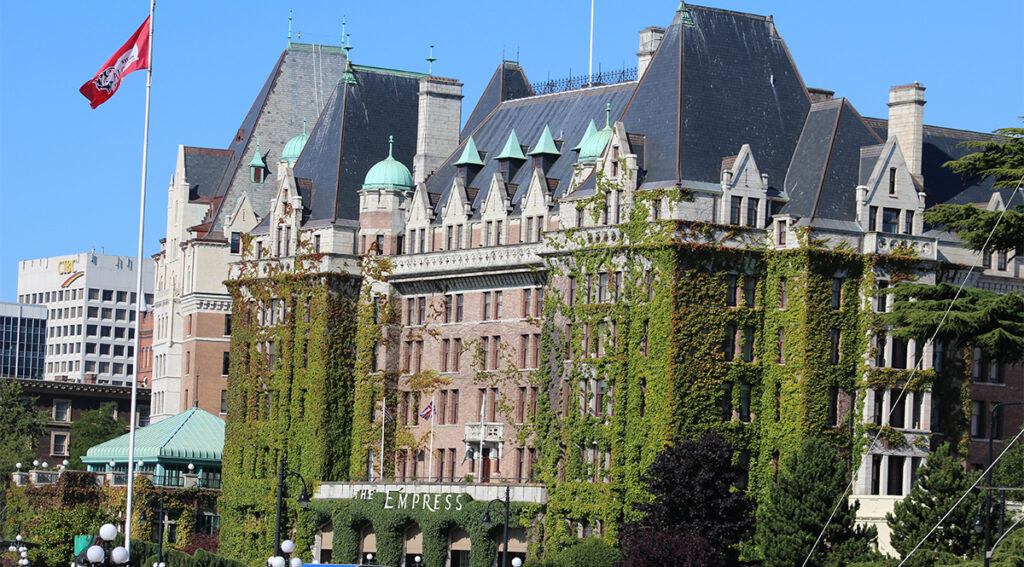
The Empress Hotel, on Government Street in Victoria, B.C., is home to a menagerie of spirits and past scandals.
‘Canada needs to catch up’
Michelle Desrochers can shed light on both sides of the story. As a former owner of a bed and breakfast, as well as a paranormal investigator, she can bring both perspectives to the forefront.
She’s based in the Niagara Region, and she made her B&B available for photoshoots, filming, and even weddings.
“There were a lot of things about it that were unique,” she said, sniffling due to a cold and during a February phone conversation. “But there was a waiting list because people knew it was haunted and people wanted to come in and investigate it.”
Desrochers admitted that she would prepare the spirits by announcing that people would be coming to the house or filming. Television shows shot on location were “Paranormal Survivor”, “Haunted Casefiles” and “My Paranormal Nightmare”, in which she appeared.
Still, they weren’t without their concerns as proprietors, especially when it came to people behind closed doors.
“People would come in here and they’d want to use Ouija boards or do seances,” she said. “I would say, ‘Well, you want to do that, then it will have to be under supervision’.
“We would have (entities) come in, like really angry things, and we’d be like ‘Oh my God, who did what now?’ And we were always forever clearing the house.”
What’s different from a large company, such as Fairmont, was that Desrochers’ main focus was to protect the spirits at the bed and breakfast and ensure that investigators did not bring any uninvited guests into the residence.
Her experience as an investigator has led her to work on the other side as well, particularly with the Kiwanis Club, which owned Casa Loma in Toronto. The City of Toronto took over ownership from the Kiwanis Club in 2011 and entered a 20-year lease agreement with Liberty Entertainment Group in 2013.
During Desrochers’ time working with Kiwanis, however, she was able to run a paranormal tour at the landmark, taking visitors on tours, sharing tales about apparitions coming down the steps of the servants’ quarters or discussing the cursed stone under a chair that was anchored to a podium off the floor — akin to Busby’s stoop chair — so no one would sit on it.
But once new ownership came in, her tour was cast out.
“They sat down with me and they were like, ‘We don’t want to continue with the program. We don’t want the stigma of ghosts. This place isn’t haunted’,” Desrochers recalled. “But I respected their decision as it’s not for everyone.”
There’s empathy in her voice, as sometimes investigations or even documentaries can experience accidents that pose a liability to an organization.
She pointed to a 2009 incident that occurred at 1 Spadina Crescent in Toronto where a 29-year-old woman died after falling from the roof during a paranormal investigation.
“I think a lot of people shy away from it because what if somebody gets hurt? How do you explain that to your insurance company?” she asked.
Still, there are plenty of locations across Canada that embrace their paranormal roots, such as the various remnants of the War of 1812 — Fort George in Niagara-on-the-Lake or Fort Henry in Kingston — or temporary lodgings like the Ottawa Jail Hostel or the Inn at the Falls in Bracebridge.
Desrochers added that Niagara-on-the-Lake is considered one of Canada’s most haunted towns with locations like the Olde Angel Inn, the Prince of Wales Hotel, the Apothecary and the Laura Secord homestead. Canadian authors Maria Da Silva and Andrew Hind go into great detail in their book Ghosts of Niagara-on-the-Lake.
“Everybody talks about it,” she admitted, noting some locations have embraced their ghost stories, and others have not. “Some of them are just not going to budge.”
When compared to the United States, Canada is not as transparent about its hunger for the paranormal, whether it’s of the cryptozoological element, UAPs or even its resident spirits.
“Canada needs to catch up a little bit, I think with that, and let loose,” she said. “A lot of these types of places are afraid it’s going to scare off customers, but some people will come for the ghosts. Some people want to buy a house because it is haunted.”
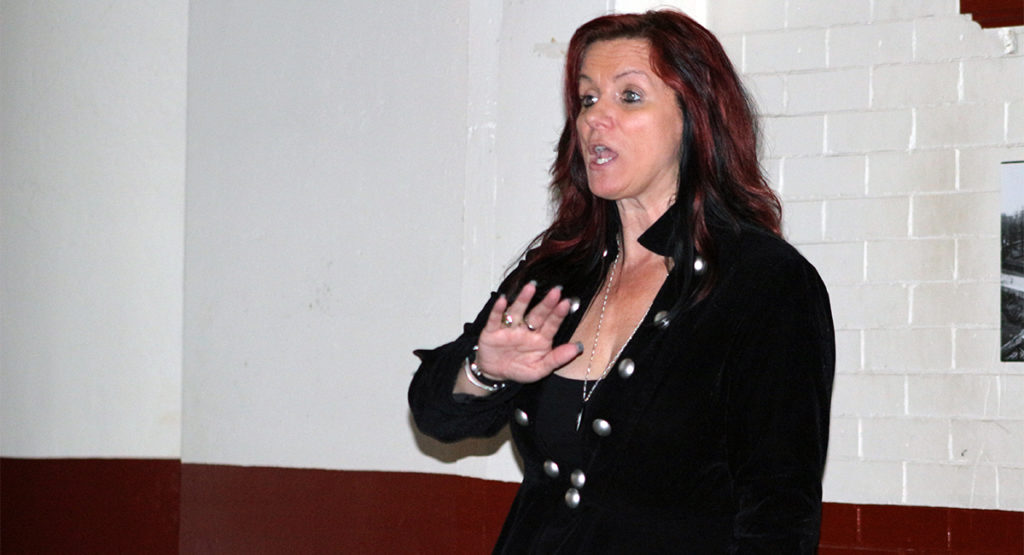
Michelle Desrochers offered a guided tour to visitors at Toronto landmark Casa Loma in 2013.
No vacancy for lost souls?
When it comes to Canada’s high-profile haunts, such as the Banff Springs Hotel, or The Empress in Victoria, or even the Royal York, many lips are kept sealed.
Accor, the current owner of Fairmont hotel properties, was mum on whether they have a policy on how to deal with ghost stories.
“We don’t have official protocols for this, as such, we don’t have anything to contribute at this time,” spokesperson Kerry Hittinger wrote in a March email. When asked follow-up questions about embracing the phenomenon and the folklore stemming from the stories, there was no response.
Regardless, the zeitgeist in the twilight of the pandemic has brought about an increased awareness and interest in all things paranormal.
It’s only a matter of time before big business capitalizes on it.

